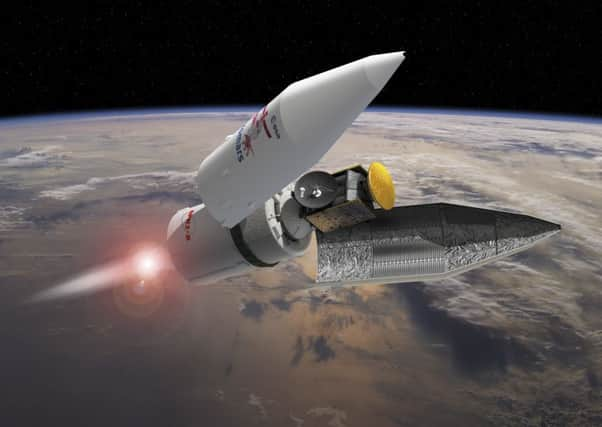Europe's mission to find life on Mars set for launch


The Proton rocket will launch the first of two ExoMars missions, together costing €1.2 billion (£924 million), designed to uncover signs of past or present life on the Red Planet.
An orbiter carried on the ExoMars 2016 mission will hunt for methane in the Martian atmosphere and show if it is likely to have been generated by geology or biological processes. Then in two years’ time, ExoMars 2018 will send a British-built rover to Mars.
Advertisement
Hide AdAdvertisement
Hide AdEquipped with a drill that can burrow deep below the radiation-baked Martian surface, it will look for the chemical fingerprints of life.
If the scientists find evidence of life it will be one of the biggest discoveries of all time. Humanity will have to re-assess its place in the universe, just as it did when Copernicus showed that the Earth and its sister planets orbited the Sun.
While American rovers have paved the way by investigating whether the Martian environment is or ever was suitable for living microbes, none of them has been equipped to search for life itself. Planetary scientist Dr Peter Grindrod, from Birkbeck, University of London, who is funded by the UK Space Agency, said: “It’s incredibly exciting.
“This is a series of missions that’s trying to address one of the fundamental questions in science: is there life anywhere else besides the Earth?
“Finding that life exists elsewhere in the solar system would be a huge discovery, so the evidence has to be strong.
“As they say, extraordinary claims require extraordinary evidence.”
The ExoMars missions are being undertaken jointly by the European Space Agency (Esa) and Russian Federal Space Agency, Roscosmos. Monday’s launch from the Baikonur Cosmodrome will send two unmanned probes on a journey across space lasting seven months.
One Trace Gas Orbiter (TGO) will sniff the atmosphere in search of methane, water vapour and other trace gases. The other, Schiaparelli will undertake a trial run of the parachute and retro-rocket technology needed for the later rover mission.
Sue Horne, head of space exploration at the UK Space Agency, said: “We hope TGO will answer once and for all the question of whether the methane has a biological or geological origin.”